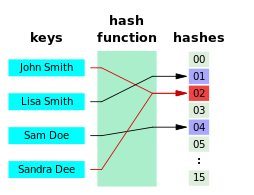
In computer science, a hash collision or hash clash[1] is when two distinct pieces of data in a hash table share the same hash value. The hash value in this case is derived from a hash function which takes a data input and returns a fixed length of bits.[2]
Although hash algorithms, especially cryptographic hash algorithms, have been created with the intent of being collision resistant, they can still sometimes map different data to the same hash (by virtue of the pigeonhole principle). Malicious users can take advantage of this to mimic, access, or alter data.[3]
Due to the possible negative applications of hash collisions in data management and computer security (in particular, cryptographic hash functions), collision avoidance has become an important topic in computer security.
- ^ Thomas, Cormen (2009), Introduction to Algorithms, MIT Press, p. 253, ISBN 978-0-262-03384-8
- ^ Stapko, Timothy (2008), "Embedded Security", Practical Embedded Security, Elsevier, pp. 83–114, doi:10.1016/b978-075068215-2.50006-9, ISBN 9780750682152, retrieved 2021-12-08
- ^ Schneier, Bruce. "Cryptanalysis of MD5 and SHA: Time for a New Standard". Computerworld. Archived from the original on 2016-03-16. Retrieved 2016-04-20.
Much more than encryption algorithms, one-way hash functions are the workhorses of modern cryptography.